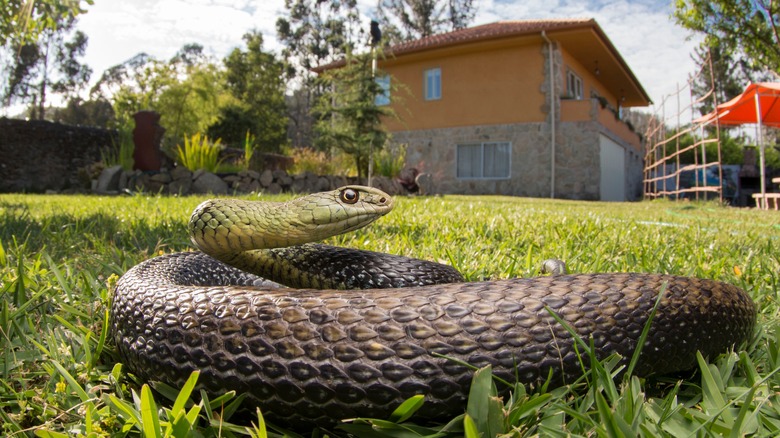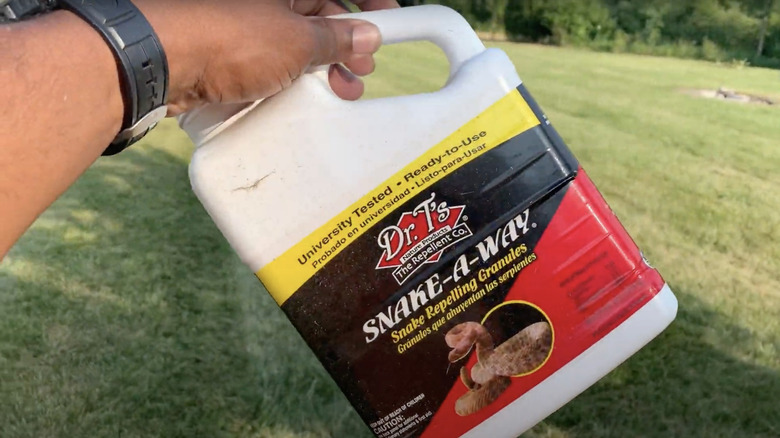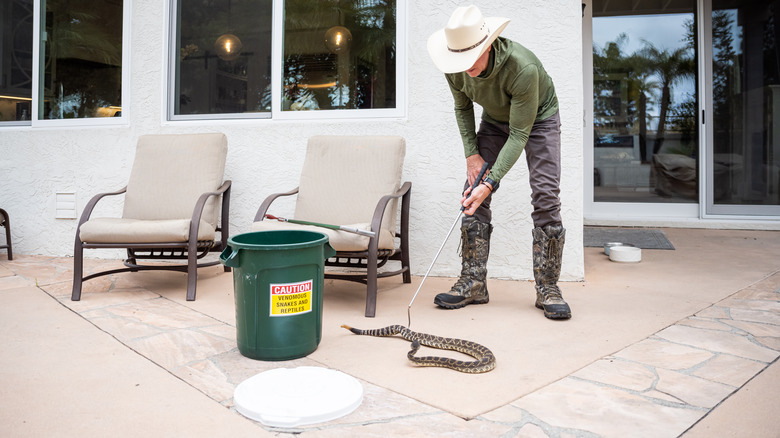Do Commercial Snake Repellents Actually Work Or Are You Tossing Money Down The Drain?
If you've been searching for foolproof ways to keep snakes from slithering around your yard, you've probably considered some commercial snake repellents. Charles van Rees, Ph.D., a conservation scientist, naturalist, and the founder of Gulo in Nature, a science and nature blog, spoke exclusively with House Digest about the effectiveness of these deterrent products. Unfortunately, Dr. van Rees explained that commercial snake-repellent products might not live up to their expectations. "I would not recommend buying commercial snake repellents," he said. "I can find no evidence from the published scientific literature indicating that any chemicals are effective at repelling snakes, or would be effective in deterring a snake who is motivated to enter your yard or home, while also being safe for you and your pets."
Additionally, Dr. van Rees pointed out that the majority of snakes you might encounter in your backyard are not particularly harmful to have near and can prove helpful. "Most people probably don't even know if snakes are using their outdoor spaces; they aren't typically messy roommates and outside of the tropics ... there are few really dangerous snakes around to begin with. Furthermore, snakes are excellent pest control and can be fun for kids to observe and learn about wildlife (from a safe distance, of course!)," Dr. van Rees said.
Why commercial snake repellents may not actually work
While some commercial products claim they are the answer for keeping snakes away and may even have positive testimonials or seemingly scientific statistics, Dr. Charles van Rees explained exclusively to House Digest that these glowing statements are typically biased. Because the goal of these companies is to sell a product, the information they put out about these snake repellents isn't always reliable, and they may not really keep snakes out of your yard.
Snake-repellent products often use strong smells to try to deter these animals, but Dr. van Rees pointed out the issues with this method. "Snakes have a well-developed sense of smell thanks to chemical-sensing organs on the tongue and what's called the vomeronasal organ, which can make them sensitive to many of the same smells that we are. Even if they have increased sensitivity, it is highly unlikely that any particular smell will put them off of an area," he said. "As one of my colleagues put it, any chemical strong enough to deter snakes will also deter people, and you still want to enjoy your own space!"
Alternatives for dealing with snakes
Using commercial snake repellents is often a mistake everyone makes when trying to get rid of snakes in their yard, but there are better ways to handle these creatures. According to Dr. Charles van Rees, who spoke exclusively with House Digest, properly maintaining your property, getting professional help, or simply leaving the snakes alone are your best options. If you're concerned about snakes making their way inside your home, Dr. van Rees explained that a little upkeep can help. "Maintaining the outside of your home, plugging up any holes to the outside (especially around the foundation and roof), and avoiding leaving doors open is an excellent preventative strategy and one that is much more likely to succeed than a commercial snake repellent," he said.
Additionally, try contacting a local, state, or federal wildlife center to humanely remove a snake, venomous or otherwise. While there are private companies you can hire to get rid of snakes, Dr. van Rees recommends wildlife centers and university extensions because they tend to be more reliable, less likely to harm the snake, and won't try to sell you something you don't need. Ensuring the snake is safe is important, as these animals are vital to the ecosystem. If the snake isn't hurting anything, Dr. van Rees suggests letting it be. "On the flip side, there are great benefits to having [snakes] around, and they are more frightened of you than you are of them!" he said.


